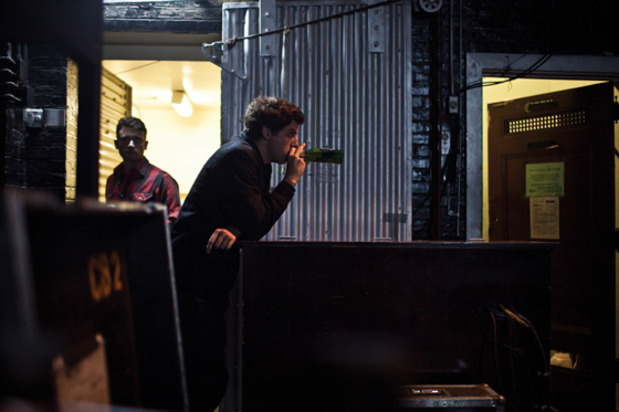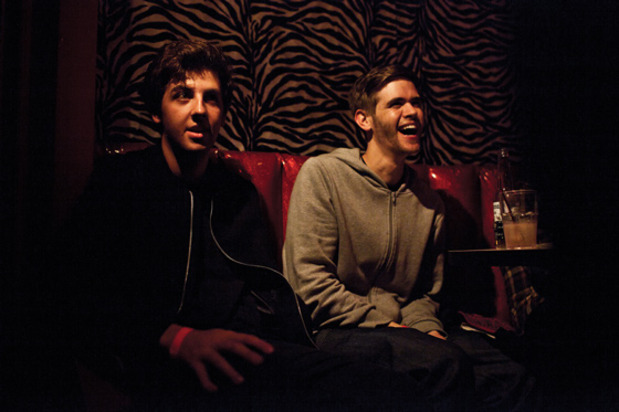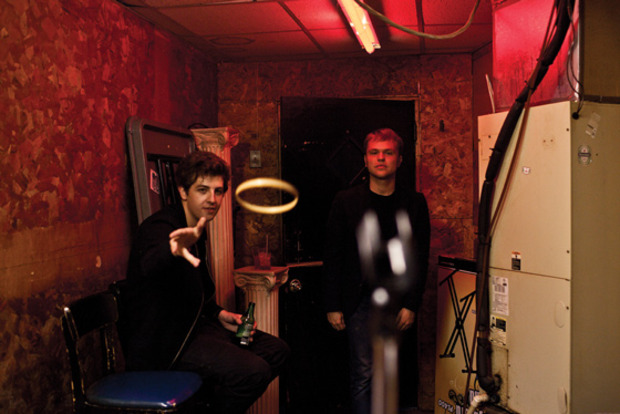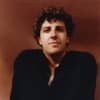Sometime around 3AM in rainy Boston, the girlfriend of the guy who let us have an after party in his apartment gets curious enough to ask what band we are in. JB says, "The XX," which is not true. But he is on tour with them, trying to get girls using his all access pass, walking around in the park unshaven, unemployed, and generally having the time of his life. Next to JB on the couch, his friend and actual XX member Jamie Smith answers truthfully. The girl says she's watched their videos but didn't recognize him. "What do you play?" she asks. He thinks for a moment, then tickles the air with his fingers. "Keyboards?" she interrupts. He considers this, pauses again then says, "I play drums."
Within the open source technological ecstasy of Gen Z, this is an accurate statement, but in the traditional sense, Smith is much more than that, a self-taught composer who rejects both the limits of his tools and the process of conventional songwriting. He grew up in London with musically-inclined parents, where he "played drums a year and a half, like with lessons, but I was never really that good." He has a working knowledge of the xylophone, and when The XX play live, he pulls out a cymbal on one song, which he did in New York, the night before Boston. The New York show was in a magnificent old theater on 175th Street in Washington Heights with gilded latticework and a very nice balcony, and its seats were filled with people who probably never had a reason to come this far uptown before. A lot of them were making out, one couple fully sprawled and groping. It was a visually beautiful performance, the band bathed in warm, white light. Smith, as always, was in the back, behind guitarist Romy Madley Croft and bassist Oliver Sim, both of whom sing. His dual samplers propped atop two large, square boxes, each with one giant X carved out and brightly backlit. He and the boxes sit on a riser in order to make him, or at least the X's, more visible. Surprisingly, this was Smith's idea, a subtle prominence for someone mostly modest and shy. But honestly, there's not much to see. The XX have only one album, and Smith has played their standard set hundreds of times, his complex duties now routine and mechanical. Only once, when he uses his right hand to play a difficult harp pattern on a sampler and his left to bring out the crunchy drums on "Heart Skipped a Beat," does he appear strained.

Backstage after the show, Smith looks tired and indifferent. Over the course of three days he only shows specific interest in doing something three times: once to take a shower, once to visit legendary Philadelphia skate spot Love Park and once to eat at DC institution Ben's Chili Bowl. He has a habit of saying "I'm easy," though it's unclear if he means he doesn't mind or that he would prefer not to bother anyone. This balance between even keel and active disinterest manifests in peculiar ways. After the New York show, everyone cabbed it 170 blocks south to Love, a literally underground club in the West Village. Smith had organized a series of after parties for each XX show with a number of his UK DJ peers, like Cooly G and Fantastic Mr. Fox, seemingly both as an effort to export his culture and to keep himself entertained. When it was Smith's turn to DJ, he immediately blew a speaker with "Beat For," a new, unreleased solo track that will soon be out on his debut single. While he futzed with the broken equipment, a stranger in a yin-yang T-shirt approached me unprompted to say Smith looked like a caterer.
Smith's baby face, quiet demeanor and cool competence may lead some to believe that he's a bit smug, but the latter two traits are actually components of a shy kid's defense mechanism. He's still only 22, but looks younger (a recent trim to tame his teen frizz is helping), and has willingly spent most of his young adult life in the studio, onstage or in a DJ booth. While he's certainly not the stereotypical child prodigy turned hermitic adult, Smith does have a bit of that gifted aura about him. "There was a lot of not going to school. My parents were surprisingly okay with it," he says of his youth. "The head of my school could see I didn't want to be there, and he'd give me time to do whatever." This allowed Smith to develop an almost savant-level interest in UK dance music, which finally pours forth at a loud Boston restaurant the night of the show. Before eating a healthy amount of chicken, Smith gets the most excited he will over the few days, talks the most words he will at once, and about half of them need footnotes:
In London there's this whole genre emerging called dubbage, it's basically like garage styled out with a two-step beat. There's only two kick drums instead of four, and then dubstep took away the next kick drum, so it's one kick drum and one snare per bar. When UK funky music came out, the combination of garage and dubstep brought back the four-four beat. Now, this dubbage thing is like your house music that borrows from UK funky and dubstep. There's no drops, really. There's this club in Brixton called The Fridge where they have this night every Saturday called Yellow, so it's like what the UK funky scene was back when it was good. It's still fresh. All the clientele at Fridge, you have to be above 23 to get in, and they're pretty much all black. You have to dress smart, it's basically just to keep all the riffraff out. I really want to go but I need to get a fake ID.
The ease with which Smith unfurls this knowledge, compared to the terseness of everything else he says, reveals the tickertape of musical calculus running through his head at all times. It is the one thing he can and will talk about at length, as long as he senses interest, and a kindred obsession.

On tour, Smith is most talkative with an excitable 22-year-old Mancunian named Stephen Gomberg, the aforementioned Fantastic Mr. Fox. They talk about records in a way that is so specific and esoteric that to parade it as universally interesting would be delusional. And even for people who speak the same vernacular, almost none of them also create music as Gomberg does, and even he doesn't create it with the same compulsion as Smith. Talking to Smith about music is like looking at a Picasso with Picasso and the head curator at the Louvre, simultaneously admiring its beauty and place in history while second-guessing the acidity of the paint or the choice of brush. Whatever the opposite of a layman is, that's Smith. And, somewhere in the middle, is Richard Russell.
Russell is the owner of XL Recordings, which distributes Young Turks, the label run by The XX's manager Caius Pawson, who released the band's self-titled debut. Russell is also a producer, having most recently collaborated with troubled legend Gil Scott-Heron on I'm New Here, his first album in 16 years. It was the result of Russell's four-year, relentless pestering of Scott-Heron, including many trips from London to New York to wrangle him into the studio. While it comes from a place of deep love and admiration, it is also made entirely from brittle British drum machines. Scott-Heron, an American soul hero, has made a long career of wrapping his gruff voice in warm electric pianos and long bass slides, but on I'm New Here, the instruments are cold and sparse, a shift in tundra Russell owes directly to Smith and his production with The XX, which is why Smith says Russell asked him to remix the album.
We're New Here, the resulting 35-minute continuous piece of peaks and valleys, is wholly different from the original album. "I just wanted it to be a completely new thing," Smith says. "I wanted it to remind you of a DJ set and not be like a mixtape. There are moments in it where I can imagine being in a club, and I tried to pinpoint different experiences that you have when you're in a club, just listening." The only thing remaining from I'm New Here, which is more bleak than not, is Scott-Heron's guttural semi-singing. Smith takes full freedom with the a capellas, using long, lyrical stretches, but also slicing syllables and looping them percussively. Scott-Heron's words become, at points, merely incantations above Smith's drums. It's as if someone challenged him to make an album where every song must include prominent tuba parts, so he bent and melted the tuba to make the sounds he wanted it to. At first it sounds brassy and bulbous, but with repeat listens you wonder why every song ever made doesn't include tuba.
It may seem an odd choice to have your solo debut carry the stamp of another man, especially one as well known as Scott-Heron, but Smith is not a frontman. Scott-Heron becomes his ghostly narrator, a pillar of salt for Smith's doleful and meticulous programming. The very end of the piece, an almost unnoticeable five seconds of dulled chatter, is Smith's dramatic denouement. "It sounds like when you walk out of a club at the end of the night," he says. "When things are slightly muffled, and people are talking and you can hear the beats of the club." It reminds the listener that where and how you hear music, even dance music, is just as important as the music itself. "The two times I enjoy music the most is hearing a DJ play it, or in bed listening to it on my own," Smith says, and the UK dance music scene seems to agree, as the sound of the club and the bedroom have begun to converge, with Smith as a new school fountainhead.

In the early '90s, two epochal scenes emerged in the UK. One was garage, their version of US house music, with soulful vocals and choppy drums, and parallel to this was the invention of drum & bass, jungle and 2-step, more specifically dancefloor-oriented genres with pummeling breakbeats. Sometime in the late '90s and early 2000s, these all fused together with the Brits' dedicated love of Jamaican music to create the exquisite corpse of dubstep, the UK's present ruler. The current moment relies heavily on the benchmark of Burial, the artist who emerged around 2003, taking the influence of dance music but disdaining the club's desire for ferocity, instead lifting the DNA of UK dance—skittish drums, tremolo bass, sweet vocals—and remapping it for the watery hours between last call and REM sleep. Listening to many of Smith's contemporaries, Burial's effect is unmistakable. Smith clarifies, though. "I'm not denying his massive influence in the scene, I'm just acknowledging the many other, lesser hyped records that influenced the huge heap of fantastic UK producers, on top of which Burial perches," he says. "I don't think any of us were thinking of Burial when making XX. I think that Burial's and our initial influences are probably very alike, and the fact that he and us grew up in the very same surroundings might have something to do with the comparison between us and him." London's perennially repressed grey skies may be the cause of both The XX and Burial, in other words, but Smith clearly sees the similarities ending there.
"A sequence of chords can mean something at one point of your life. Then if you go back, they can mean something else. Whereas lyrics… they mean what they mean."
Smith's productions are wily. He'll often introduce a grand theme with ecstatic percussion, only to drop it a few bars later for a halcyon moment of calm. Usually, though, he leaves some vague signifier of rhythm so your brain can fill in the rest, like having the first and last few letters of a crossword puzzle. It's a confident and generous position, giving credit to a smart listener, and that trust has gained him numerous fans outside of the immediate dance music community. Separate from The XX, Smith's powers as a producer were first widely appreciated for his remix of Florence and the Machine's Candy Staton cover, "You Got the Love." He lifted Florence Welch's dramatic a capella and not much else, dicing her chorus above lustrous xylophone and tumbling bass. Madley Croft and Sim re-sing the verses, as though he were not comfortable working with complete thoughts were they not mediated through their voices. The song was an enormous hit, and when they performed it live at the Glastonbury Festival last spring with Welch, a million kids panted along to choppily-processed syllables.
"I guess the link between all the music I listen to is the fact that I'm not interested in vocals. I never really got them. I'm much more interested in instrumental music, from jazz to dance music or whatever. So it kind of just made sense to use vocals as an instrument, rather than as an emotional device," Smith says. On "Far Nearer," his new single for the Glasgow-based dance label Numbers, a warped vocal repeats the somewhat indecipherable and essentially meaningless You/ Me and I feel better. But untethered, floating in Smith's steamy drums, they feel like buoys. Smith says the vocals are a Janet Jackson sample and that Numbers won't release it for fear of legal reprisal, so he's going to have a session musician (possibly Chaka Khan's daughter) record the entire Jackson song from scratch, so he can cut it up again. To him, the original vocal isn't about lyrics but palette, something he can dab and use to paint entire swaths of music. It feels at once dehumanizing and totally ecstatic—Janet Jackson, or whoever, freed from the total tyranny of her common sense. "I find a sequence of chords much more effective for me. Because a sequence of chords can mean something at one point of your life. Then if you go back, they can mean something else. Whereas lyrics… they mean what they mean."

You get the sense that if Smith could rearrange real life in this way, he would. Many times, backstage, amidst friends and band members, he sits at his laptop with headphones on, working on a track, in his own submarine in a sea of people. In the earliest days of his solo productions, in the midst of The XX's rise, he flirted with the idea of using the pseudonym Silentone. He even released tracks under the name, but didn't tell anyone that was him. You could tell, though. He made one long mix, commissioned by the super cool Parisian boutique Colette, and all of the best songs were by Silentone, none of which were searchable on the internet. His manager later confirmed that it was Smith, saying he wasn't so much afraid of people knowing it was him as that he needed a club-appropriate nom de plume.
The club has always been a safe space for Smith, both behind the turntable and on the floor. It's one of the few places where you are not expected to talk and are amongst other people who are not talking. In Philadelphia, after Smith's DJ set, he retires to a red banquette against the zebra print wall. Pawson, The XX's manager, is sitting next to him and they are speaking. I sit down next to Smith and he goes quiet. The president and vice president of The XX fan club are at the after party, asking more than once for photos of Smith and Madley Croft. Smith obliges, smiling genuinely. "This was something that just happened. I definitely didn't plan it," he says about The XX's popularity. Smith's just a few dates from the welcome end of two years of touring and promotion, though the day after he returns home to London he'll head out on a DJ tour with rapper MF Doom. In the beginning of the Colette mix, he included a Streets song, "Streets Score," that may as well have been written about Smith. In the studio immersed in, rehearsing my technique/ I live loops, sleep snares and breathe beats/ Sift through, keep the best there and only leave to eat, Mike Skinner raps over a cinematic background, before illustrating how life has devolved because of his insatiable musical obsession. To him, and to Smith, there is nothing else, just distraction.
Outside after the party, the entire XX crew and entourage are pretty wasted. Someone has a wobbly skateboard and a tiny, rusted tricycle, and everyone's taking turns cruising the slick street. JB is making huge S-curves when a seafoam limo straight out of 1991 rolls by slow. He latches on, attempting a furtive ride. The back window rolls down and an anonymous middle finger juts out in protest. Everyone laughs. Smith's here too, though he isn't saying or doing much. He's got a bag of records and CDs on his shoulder and his arms crossed around his chest. He might have just smiled, but it's hard to say.



